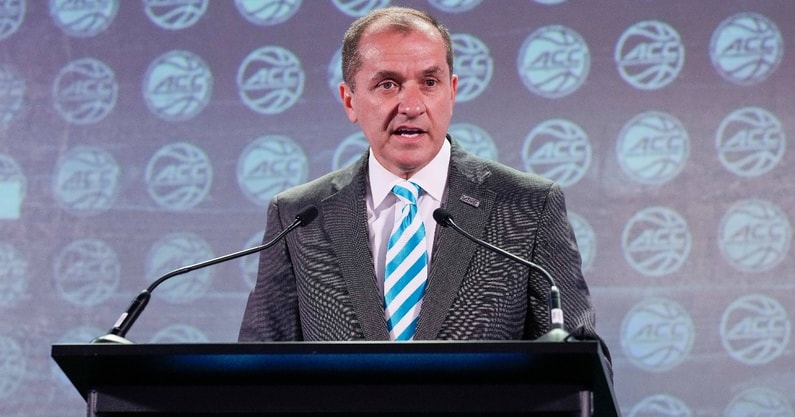ACC files counter suit against Clemson in North Carolina

A day after Clemson University filed a 28-page complaint challenging the ACC’s Grant of Rights, the conference has answered with a countersuit.
Filed Wednesday in Mecklenburg County, North Carolina, court, the 133-page lawsuit argues that the Tigers cannot get out of the Grant of Rights or the conference’s exit fee. The ACC has made the same argument in its legal battle with Florida State, which was also filed in Mecklenburg County.
“The ACC is a great conference, and this increases the national exposure, brings in additional revenue and offers greater opportunity for student-athletes,” the lawsuit opens, a direct quote from Clemson president James P. Clements. “… For us and the Florida States and others, it stabilizes the conference long term.”
Florida State has also been entrenched in a legal battle with the conference for months, and it could just be a matter of time until a third university joins the battle. North Carolina voted with Clemson and FSU against the additions of SMU, Cal and Stanford this past summer.
Clemson’s lawsuit is specifically centered around the ACC’s Grant of Rights, which binds the league, schools and broadcast partners together until the ESPN deal expires in 2036. Each ACC school is only making roughly $23.3 million annually. The latest Big Ten deal is expected to pay institutions between $70 to $100 million per year.
ACC seeking court ruling that Clemson owes fiduciary duties
According to the lawsuit, the ACC is, “seeking a declaration that the withdrawal payment is a valid and enforceable contract term applicable to Clemson,” and a “declaration that the language of the ACC’s Grant of Rights means what it says and that Clemson’s grant of rights is exclusive and irrevocable through the term.”
The ACC is also seeking a declaration that “Clemson owes fiduciary duties to the ACC as a Member Institution” and “damages for Clemson’s breach of the Grant of Rights.”
Similar to the ongoing lawsuit with the Seminoles, the conference believes the case should play out in North Carolina because the Grant of Rights, ACC Constitution and ACC Bylaws are North Carolina contracts. The ACC and Florida State are slated to meet for the first time in court, scheduled for Friday in Mecklenburg County. Another motion hearing is set for 9:30 a.m. ET on April 9 in Leon County.
The ACC argues in the Grant of Rights that Clemson transferred all of its rights and sublicense to all games to the league until the end of the rights’ term, which is 2036. Tuesday’s filing from the Tigers coincided with ESPN and the College Football Playoff finalizing its six-year agreement that will average $1.3 billion annually. With the new deal, Big Ten and SEC institutions will receive an annual payout of roughly $21 million.
ACC schools, Clemson included, will make $13 million per year. The conference also argues that, “No applicable common law or any other law creates any fiduciary duties that would be owed by the member of an unincorporated nonprofit association.”
Top 10
- 1Breaking
Florida tops Houston
Gators are champs
- 2New
Predicting Final AP Poll
Projected Top 25 after Florida crowned
- 3Hot
Way-Too-Early Top 25
Looking ahead to 2025-26 hoops
- 4
Jay Bilas
Calls out ACC in defense of Duke
- 5
Mouhamed Dioubate
Alabama transfer commits to Kentucky
Get the On3 Top 10 to your inbox every morning
By clicking "Subscribe to Newsletter", I agree to On3's Privacy Notice, Terms, and use of my personal information described therein.
Yet Clemson’s lawyers wrote Tuesday that, “The ACC has recently claimed in court filings that its members owe the Conference fiduciary duties arising from the ACC Constitution.”
Lawsuit states Clemson tried to work with ACC
Clemson tried to work with the ACC after the Florida State legal battle began, according to the case.
“Clemson indicated a desire to work with the Conference regarding its own membership in the Conference and requested assurances of confidentiality and protections that the ACC would not file a lawsuit against it,” the filing states. “The ACC agreed to work with Clemson, seeking a business solution rather than resorting to litigation.”
The two parties have clearly not worked together. Clemson’s decision to file a complaint against the league the first step in its possible exit of the conference. Tuesday’s filing from the Tigers made clear they are seeking the rights to their games after leaving the ACC.
Clemson had been preparing for this moment for months. Lawyers had been preparing the lawsuit in the shadows, compared to Florida State being vocal from the start. Included in filings of the countersuit from the ACC are copies of the Grant of Rights and updated Grant of Rights’ signature pages, which feature Clements’ signature. The league used the same tactic with Florida State.
In a parting shot in the prayer for relief section, the ACC requested the court rule “costs of this action to Clemson.”